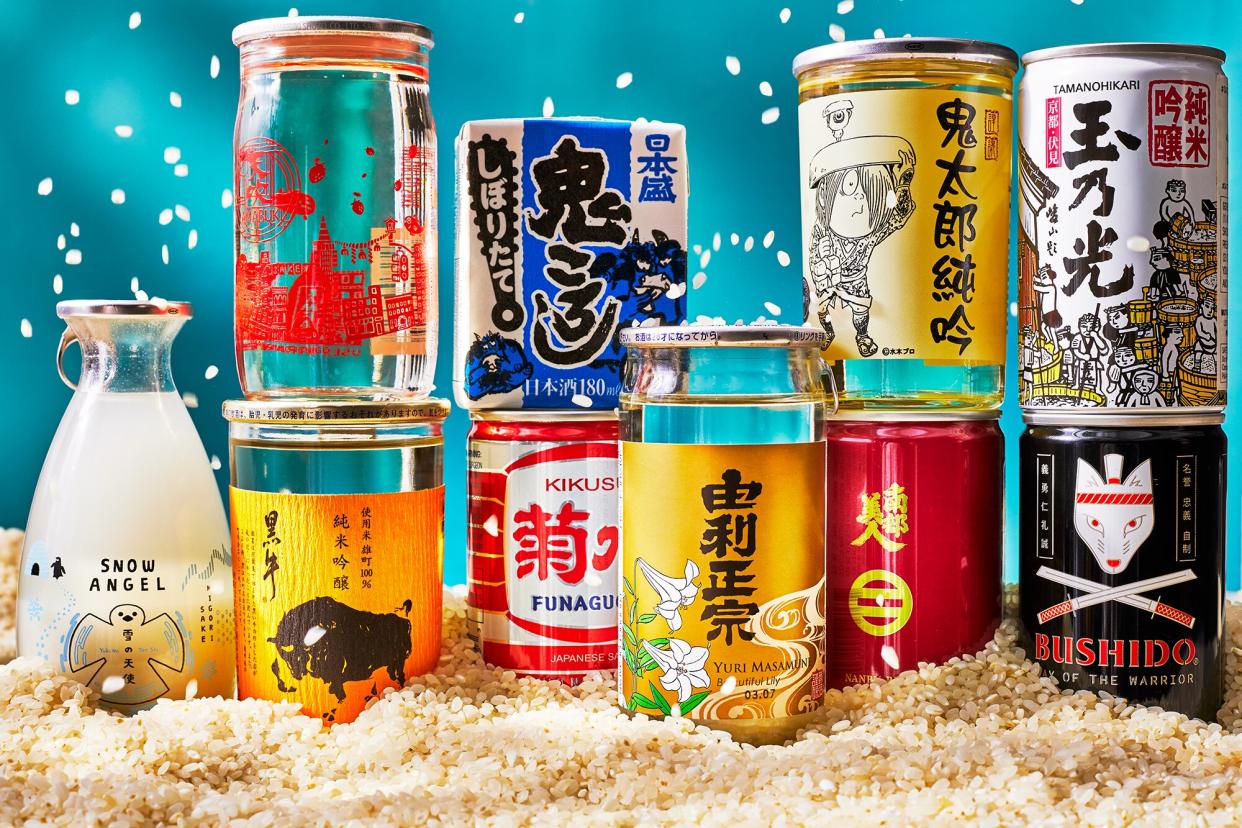We Tasted Over 50 Canned, Cupped, and Boxed Sakes — Here Are Our Favorites

Photo by Caitlin Bensel / Food Styling by Ruth Blackburn / Prop Styling by Lydia Pursell
Sake one-cups first hit the world at the opening ceremony of the 1964 Summer Olympics in Tokyo. The launch was a surprising success; what had become for Japanese drinkers an unfashionable beverage was reconceived for casual, on-the-go consumption, and people loved it. Unfortunately, quality was a secondary concern at the time, and since then, sake cups and cans have largely been thought of as mediocre at best—the stuff of drunken vending-machine run-ins or all-night guzzling in pubs and izakayas. But in recent years, two shifts have happened. First, single-serving sakes have improved wildly. And second, they've traveled to the U.S.
You may think of a juice box of sake with a glued-on, plastic-wrapped straw as an iffy proposition, but these days, sake cups and cans are packing impressive flavor into fun-sized packages. Plus, single-serve portions are a great way to test out quality sake without having to wince at the checkout counter. Take a stroll down your local sake shop's most fun-loving aisle and grab some sake cups. And don't fall prey to our common feeling that sake is only for Japanese cuisine—try it with pizza, noodles, oysters, even barbecue. Really, anything goes.
1. Amabuki Junmai Ginjo Ichigo ($8)
Known for brewing with unconventional yeasts, the Amabuki brewery's playful use of strawberry yeast lives up to its promise: This unusual, delicious sake smells like a light beer, with succulent fruit and a hint of acidity on the palate.
2. Nihon Sakari Onikoroshi Futsushu Box ($3)
Sealed inside this juice box is a shiboritate (fresh-pressed) sake made with crisp miyamizu water from the local springs of Nishinomiya and filled with melon and lychee notes and a cooling finish.
3. Chiyomusubi Kitaro Jungin ($8)
Kitaro is the main char-acter of the Japanese manga GeGeGe no Kitaro, pride and joy of Tottori, the home of this brewery. But even though this sake is named after a cartoon, it's deeply complex: yeasty, with mellow notes of bananas and vanilla.
4. Tamanohikari Junmai Ginjo ($6)
Over its 340-year history, Tamanohikari has mastered the old-school yamahai brewing method. Also, junmai sakes are known for their soft richness, and this offering is classic junmai. Try it warmed for an even more plush texture.
5. Snow Angel ($7)
Smelling like warm rice and tasting like Juicy Fruit gum, this midweight, unfiltered sake is an absolute crowd-pleaser. It's a great example of an off-dry nigori sake that's full-bodied enough to stand up to spicy stews or rich braised meat.
6. Kuroushi Junmai Ginjo Black Bull ($13)
Brewed from premium omachi rice, an ancient heirloom rice variety from Okayama, this can is a testament to its origins: Its full-bodied rice flavor brings a little sweetness together with a lot of umami.
7. Kikusui Funaguchi Red ($7)
Sake for the bold! Aged and unpasteurized, this cask-strength ginjo from a renowned Niigata prefecture brewery has bright, jewel-toned sweetness and burnt caramel umami notes; it ends slightly but appealingly astringent.
8. Yuri Masamune Honjozo ($6)
Yuri Masamune carries the same elegance that the Saiya Brewery's higher-end sakes are famous for. It's a honjozo sake, and the addition of brewer's alcohol brightens the sweet, floral taste of the mountainous Akita prefecture's water.
9. Nanbu Bijin Tokubetsu Junmai ($9)
Apple, plum, and pear sing high notes in this light-on-the-palate sake that punches above its weight, sipping more like a junmai ginjo. Because it's made without charcoal filtering, it keeps its light, straw-colored hue.
10. Bushido Way of the Warrior ($6)
Like a good-quality everyday red wine, Bushido is easy and approachable: palate-coating with quenching fruit and a bit of bite. At 18% ABV, this genshu sake has been taken through the fermentation process without any added water.

